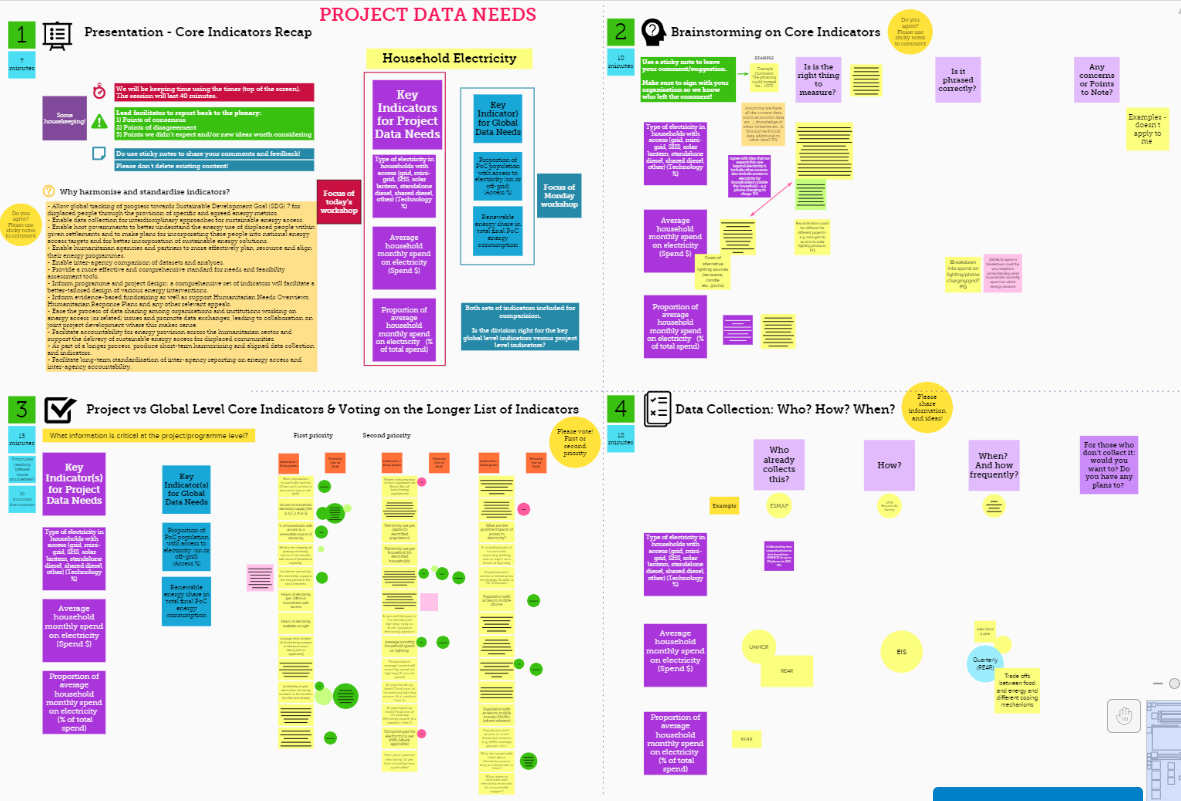In this section
In this sectionEven in 2020, we lack a comprehensive overview of how many displaced people have access to energy within the humanitarian contexts. Crisis affected populations, such as refugees and the displaced, often fall in a grey zone as they are under the remit of UN and NGO partners rather than national governments. Slow progress on gathering data on energy access has also been a function of missing standard procedures and limited guidance on data collection to measure energy access rates or understand the energy needs of displaced communities. To support the build-up of energy data within the humanitarian sector, the Global Plan of Action Coordination Unit (GPA) and Chatham House have been working with humanitarian sector partners to map out the types of energy indicators that can lay the foundation for a harmonised data collection and analysis in forced displacement settings.
To discuss early outputs of this work, two workshops were organised at the start of July to discuss indicators for measuring energy access at the global and programme levels. The primary objective of the workshops was to align key humanitarian, development and energy partners around a common framework for energy data collection, analysis and reporting in humanitarian contexts. Such alignment supports progress towards measuring global progress on SDG 7 in humanitarian contexts, and facilitates inputs to the coordinated pipeline of energy programmes being developed by the UNHCR Clean Energy Challenge. Rather than creating new indicators or ways of collecting data, a key tenant of the workshops was to draw on existing mechanisms and widely used tools and processes across the energy access sector. For example, by building on work done by the World Bank and ESMAP on the Multi-Tier Framework.
During the workshops, presentations were given on the energy data currently collected by various humanitarian stakeholders, including UNHCR and IOM, and existing standard data collection processes for measuring progress on SDG7. Then, the pre-workshop research on mapping existing indicators for measurement of energy access levels was presented as the basis for a series of interactive breakout discussions. These focused on global and programme data core indicators to determine their relevance and importance against other, non-core indicators. Participants also had the opportunity to discuss data collection to understand which organisations already collected data on the outlined indicators.
Workshops participants engaged with an interactive whiteboard (Mural) to brainstorm and share ideas, comments and votes on specific indicators.
Workshop participants felt strongly that developing a global data baseline on energy access in humanitarian settings is an important aim for the sector but also recognised that at the programme level it is much more challenging to harmonise core indicators as they heavily depend on the context, the scope of the project, and what it is trying to achieve. Participants also highlighted the need to not only push for alignment among the implementing stakeholders but also the donors given their reporting requirements which often dictate what indicators are used and what type of data is collected.
The high-level recommendations developed as a follow up to the two workshops are:
1. For measuring and reporting global levels of energy access in forced displacement settings:
- Coordinate learning and exchanges across the humanitarian sector on energy data, evidence, monitoring and evaluation techniques, and learning needs.
- List and discuss with the main data custodians who do global energy access level modelling and reporting as well as main custodians of humanitarian data collection to understand their data collection processes (ground and global level).
- Develop concrete steps with humanitarian agencies to adopt existing standard energy data indicators (i.e. SDG7 and MTF) in their reporting in order to systematically measure energy access levels in forced displacement settings.
- Support humanitarian agencies and partners in integrating energy questions into existing multi-sector surveys which are carried out to mainstream energy indicators into local and global reporting.
- Work with energy, development, humanitarian and private sector partners to define clear ownership, coordinate and streamline reporting and analysis on energy access data.
2. For the collection, reporting and analysis of energy data for programme and project development:
- Support organisations in defining energy data collection tools, including developing a proposed standardised survey format for the aggregated data accessibility by the contributing organisation. Working with partners to:
- Map existing platforms for storing energy reports, case studies, and best practice guidance for energy projects in forced displacement settings.
- Collate list of ‘best practice’ surveys with an associate menu of options for suggested indicators that to include in data collection.
- Create or adapt existing technical tools to support streamlined data collection and reporting by humanitarian organisations (both agencies and implementing partners), aiming to easily collect and aggregate high-quality, comparative data.
- Explore collaboration on funding proposals by organisations or groups (such as a coalition of INGOs) to carry out energy assessments in selected locations.
The intention with these recommendations is to develop a roadmap on way forward in the data alignment process, through follow on stakeholder consultations and a second online workshop to support global progress on this issue. The GPA Coordination Unit and Chatham House will continue facilitating the process with all partners involved. Understanding what indicators and data is needed, and streamlining data collection, analysis, reporting and sharing processes, will play an important role in improving access to affordable and reliable clean energy at scale for displaced populations and their local hosting communities. Read the full report on the workshop. A further workshop on data collection and analysis techniques will be held in the Autumn of 2020. For more information on this topic or to engage in these discussions, please reach out to Iwona Bisaga and Jonathan Archimi.
About the authors:
Dr Iwona Bisaga is a Research Consultant with Chatham House and a Post-doctoral Researcher at the University College London.
Dr Sarah Rosenberg-Jansen is an independent academic with the University of Oxford and a consultant for the GPA data and evidence working group.
Last updated: 03/09/2020

